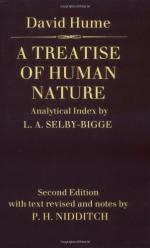
|
Book 1, Part 1, Of Ideas, Their Origin, Composition, Connexion, Abstraction, Etc.
• Hume says his aim in the Treatise is to analyze the workings of the individual human and his society. As such he will focus not on what exists in the world but on what Hume calls ideas, impressions, perceptions and the relations between them.
• Hume argues for the validity of empiricism, which is the idea that we base all of our knowledge on our own experiences.
• Hume uses empiricism to examine several philosophical concepts. First, he claims we form all our complex ideas from simpler ideas. We form these from impressions we receive through our senses.
• Hume claims we must experience matters of fact and that one does not arrive at them instinctively. For example, since we have no experience of God as a living creature we have no reason to believe that he is real.
Book 1, Part 2, Of The Ideas of Space and Time
|
This section contains 1,402 words (approx. 5 pages at 300 words per page) |

|




